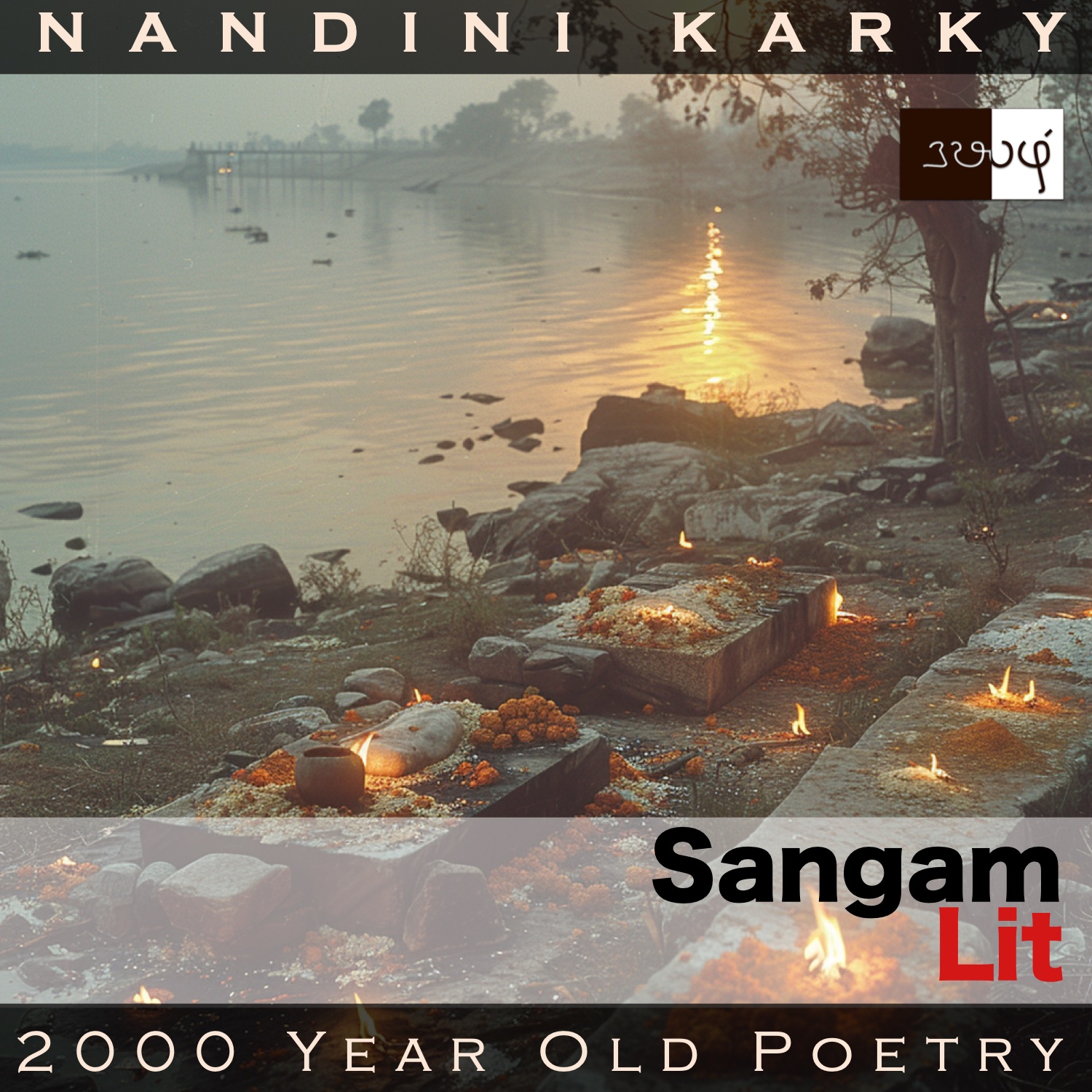Podcast: Play in new window | Download
Subscribe: Apple Podcasts | Spotify | Amazon Music | Android | iHeartRadio | TuneIn | RSS | More
In this episode, we perceive a study in contrast, as depicted in Sangam Literary work, Puranaanooru 360, penned for the leader Thanthu Maaran by the poet Sangavarunar. The verse is situated in the category of ‘Kaanji Thinai’ or ‘Defence’ and elaborates on the virtues of the great.

பெரிது ஆராச் சிறு சினத்தர்,
சில சொல்லான் பல கேள்வியர்,
நுண் உணர்வினான் பெருங் கொடையர்,
கலுழ் நனையான் தண் தேறலர்,
கனி குய்யான் கொழுந் துவையர்,
தாழ் உவந்து தழூஉ மொழியர்,
பயன் உறுப்பப் பலர்க்கு ஆற்றி,
ஏமம் ஆக இந் நிலம் ஆண்டோர்
சிலரே; பெரும! கேள், இனி: நாளும்,
பலரே, தகையஃது அறியாதோரே;
அன்னோர் செல்வமும் மன்னி நில்லாது;
இன்னும் அற்று, அதன் பண்பே; அதனால்,
நிச்சமும் ஒழுக்கம் முட்டிலை; பரிசில்
நச்சுவர் கையின் நிரப்பல் ஓம்புமதி; அச்சு வரப்
பாறு இறை கொண்ட பறந்தலை, மா கத
கள்ளி போகிய களரி மருங்கின்,
வெள்ளில் நிறுத்த பின்றை, கள்ளொடு
புல்லகத்து இட்ட சில் அவிழ் வல்சி,
புலையன் ஏவ, புல் மேல் அமர்ந்து உண்டு,
அழல் வாய்ப் புக்க பின்னும்,
பலர் வாய்த்து இராஅர், பருத்து உண்டோரே.
A long song filled with many abstractions about character. The poet’s words can be translated as follows:
“Instead of a long festering rage, they are prone to short bouts of anger; They speak a little and listen a lot; They are intricately sensitive and vastly generous; From cloudy toddy, they filter and render clear toddy; They offer fleshy pieces of meat, fried in spices; They speak with humility and embrace with affection; Serving with meaning to many, like a protective wall, those who ruled this land in this way, are but a few;
O lord, listen, many are those who know not to live in that manner; The wealth of these people is bound not to last; In any case, that’s the nature of wealth; And so, never shirk away from living a life of righteousness every day; Fill the hands of those who come seeking to you and protect them;
In that fear-evoking, ruined widespread place, where dense clusters of cactus fills the salty soil, even after seeing a corpse being lain on the bier, as toddy and a few grains of cooked rice are placed on the grass, and as the cremator instructs, sitting on the grass, eating the same, and seeing the body step into the mouth of the flames, there are many who share not with others, but hoard and eat for themselves!”
Let’s delve into the details. The poet lists different qualities of a certain group of people starting with how they don’t carry their anger for long but express it quickly and are done with it. The next quality is in how they speak less and listen more, a motto that is the path to knowledge be it two thousand years ago or today. The spotlight then falls on their sensitive and generous quality. To give an instance of generosity, the poet talks about how they serve filtered toddy and fleshy meat to those who come seeking. Always, they are known to speak humbly and with true affection. These people who sound so loveable and respectable are few, the poet adds, saying only very few such rulers have lived in this land. And he contrasts this with others, who do not live so generously, and ironically, it’s their wealth that’s not going to last, says this poet. He turns into advice mode and tells this leader to follow the path of rendering ceaselessly to those who come seeking to him. Turning his attention to a cremation ground, the poet talks about some people, who even after seeing a corpse being laid there, and following the instructions of the cremator, by offering rice and toddy and partaking the same, and then seeing the corpse burn to ashes, they still go on and live a life of not sharing, and concludes by implying that fame shall never come their way.
A verse which gives insight into what was considered noble and laudable in the Sangam era and surprisingly many of these qualities of having moderate tempers, speaking less, listening more, having humility and affection are appreciated in the same manner even now. And that final note on those who continue to live on how they always do, even after seeing death’s work, it’s as if the poet is crying out, ‘How can they?’, ‘Won’t they ever change?’. Maybe it’s a morose mood that most of these poems are evoking but that subtle nudge to face our mortality is sure to render lessons many for living a meaningful life!




Share your thoughts...